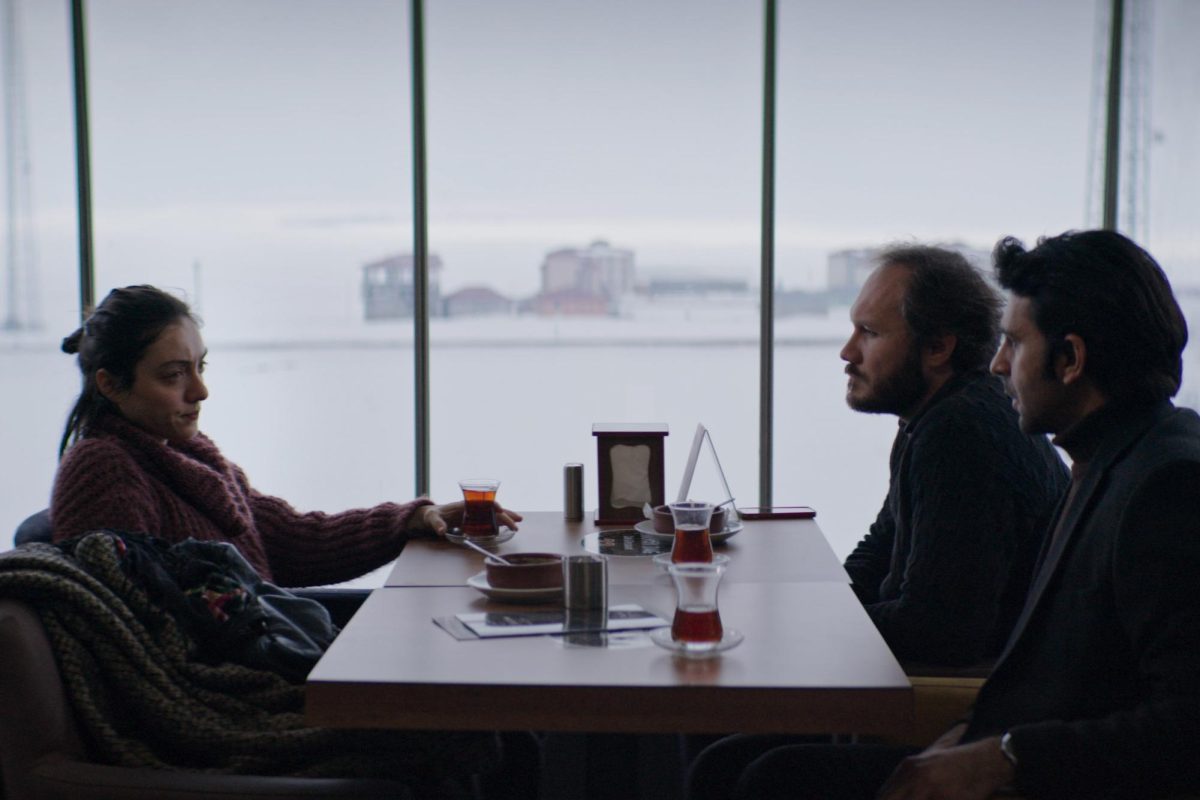Set in a small Eastern Anatolian village, the newest feature from Turkish filmmaker Nuri Bilge Ceylan captures the existential burdens of a group of school teachers completing their compulsory civil service in one of the country’s most isolated regions. Ceylan, director of the acclaimed “Once Upon a Time in Anatolia” and Palme d’Or-winning “Winter Sleep,” is no stranger to subjects of obscure motives. This latest film is a subtle drama that is as haunting as it is evocative.
Samet (Deniz Celiloğlu) is a public school art teacher at the end of his fourth year of mandatory teaching in Anatolia, after which he can be transferred to his preferred teaching post in Istanbul. Celiloğlu highlights Samet’s alienation and disgruntled attitudes, toggling between apathy, vitriol and pure boredom in a masterfully controlled performance.
After Samet is accused of inappropriate conduct by two eighth grade students, he finds himself completely disoriented, caught in the crossfire of damaging yet vague accusations. They threaten his professional life but also are emotionally distressing, as one of his accusers Sevim (Ece Bağcı) was his favorite student. Simultaneously, he befriends Nuray (Merve Dizdar), an English teacher at a neighboring school, which causes a usually disaffected Samet to become more introspective — reflecting on various relationships in his life. Dizdar, who received last year’s award for Best Actress at the 2023 Cannes Film Festival, inhabits Nuray with a gentle demeanor and an impassioned soul.
Nuray’s character is the film’s compassionate center. Her left-wing politics and weary optimism leave an impression on Samet and on his colleague Kenan (Musab Ekici). This hope pioneers a new start for Samet, and Nuray provides him with a much-needed ideological challenger. Their dynamic is epitomized over dinner in one of the film’s most electric scenes, during which each hashed out their personal doctrines. The ability to move forward through political oppression, past trauma and personal mistakes in favor of collective progress is an arduous task, and the film places the audience at the center of this battle.
With much of Samet’s morality left up to the viewer, we are forced to reckon with all his outward pessimism and inward flaws. His ambiguous relationship with Sevim remains the film’s most scandalous subplot, as her accusation against him lingers over each scene in the film.
While dominated by a tone of bleak realism, Ceylan allows for moments of humor, usually from Samet, who constantly injects a sardonic tinge into conversation. The screenplay, co-written by Ceylan alongside his wife Ebru and Akin Aksu, provides an incremental pacing that carries the film’s nearly three-and-a-half-hour runtime with extended scenes of sharp dialogue. The staggering cinematography from Kürşat Üresin and Cevahir Şahin allows attention to be paid to the intimacy of a face and the expansive and seemingly perpetual snowy environs.
The blizzarding atmosphere of the environment can feel increasingly claustrophobic, and as tensions in the film begin to boil, much like Samet, one feels the need to escape. But Ceylan never quite suffocates the viewer with this feeling, and just when it may seem too much, he weaves in sublime moments of human connection, including a remarkable sequence of metacinema, where he blends cinema and reality. This point in particular occurs when Samet walks right out of a scene and onto the set of the film, revealing Nuray’s small cottage to exist within a large empty industrial warehouse. Despite no words being spoken, Samet and Celiloğlu briefly exist together, and Ceylan muddles the line between truth and fiction in a mesmerizing display of directorial agency.
Both Samet and Nuray spend their free time indulging in artistic practices, with Samet taking photographs of village residents and Nuray finishing up drawings. Over an afternoon lunch, Nuray asks Kenan if she can take his photograph. She describes his appearance as “a face that somehow embodies the story of this land.”
In a few scenes, Ceylan projects onto the screen Samet’s photographs of ordinary Turks going about their daily lives. Sounds of life emit from Samet’s images, and a similar magic occurs when the camera pans over Nuray’s drawings later in the film. Ceylan, who began his career as a photographer, uses these sequences to demonstrate the transcendent power of art and its ability to reveal the beauty in our mundanity. As a filmmaker, Ceylan tests this hypothesis further, making “About Dry Grasses” both a daring and deeply humanistic exploration of conflicting moralities in search of a better way of living.
Contact Nolan Morris at [email protected].























































































































































